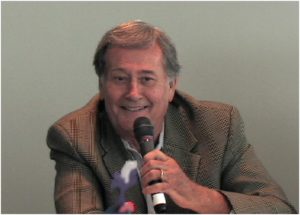What does the future hold for public education, and how can we shape the future to ensure that all our students benefit? A panel of  expert educators and policy makers offered their suggestions built around the three themes of CTL’s 20th Anniversary Education Forum and Celebration: innovation, equity and systems change. On the panel were: Gene Wilhoit who heads the Center for Innovation at UK and was the former KY Education Commissioner; current KY Education Commissioner Dr. Terry Holliday; KY 2013 HS Teacher of the Year and a faculty member at DuPont Manual HS in Jefferson County, Allison Hunt; President of the Southern Education Foundation and former Undersecretary of the USDOE Dr. Kent McGuire; and Chief Academic Officer for Jefferson County Public Schools Dr. Dewey Hensley. In this fourth blog following the September 9th event, key ideas emerging from the panel are synthesized.
expert educators and policy makers offered their suggestions built around the three themes of CTL’s 20th Anniversary Education Forum and Celebration: innovation, equity and systems change. On the panel were: Gene Wilhoit who heads the Center for Innovation at UK and was the former KY Education Commissioner; current KY Education Commissioner Dr. Terry Holliday; KY 2013 HS Teacher of the Year and a faculty member at DuPont Manual HS in Jefferson County, Allison Hunt; President of the Southern Education Foundation and former Undersecretary of the USDOE Dr. Kent McGuire; and Chief Academic Officer for Jefferson County Public Schools Dr. Dewey Hensley. In this fourth blog following the September 9th event, key ideas emerging from the panel are synthesized.
The question of standardization versus innovation was raised by panelist Gene Wilhoit (pictured above). He noted that the factory model of education still persists even though it does not yield the kind of results we hope for. Mr. Wilhoit asked fellow panel members and participants: What is the system we aspire to? He commented that we need agreed-upon outcomes but the freedom to try different approaches, share results and use action research to develop a  knowledge base that will create a different future. Fellow panelist Dr. Kent McGuire (pictured below) elaborated, asking participants to consider the system we currently have as compared to the system we need to assure equity for all students. He added that we must re-think accountability which in its current form promotes mistrust and compliance, and instead emphasize teacher judgment and responsibility. Dr. McGuire challenged participants to think differently about equity, shifting from the current narrow construct of achievement gaps to moving everyone up.
knowledge base that will create a different future. Fellow panelist Dr. Kent McGuire (pictured below) elaborated, asking participants to consider the system we currently have as compared to the system we need to assure equity for all students. He added that we must re-think accountability which in its current form promotes mistrust and compliance, and instead emphasize teacher judgment and responsibility. Dr. McGuire challenged participants to think differently about equity, shifting from the current narrow construct of achievement gaps to moving everyone up.
Dr. Terry Holliday suggested that measurement gets in the way of innovation, and asked a two-part question: whose definition of success are we using, and how do we define exemplary? He posited that we need buy-in from the community and teachers in defining what is exemplary, to remove barriers as we are in Kentucky with the Districts of Innovation, and to win the narrative about education through teachers and changing the teaching profession. Dr. McGuire added to this sentiment, that there is a negative narrative about education, and to counter that narrative we need to lift aspirations, and have a bigger ambition for the U.S. and the role of education.
 Allison Hunt, pictured here with Dr. Holliday and Dr. Hensley, suggested that teachers need space to innovate, ask questions and find answers to improve their practice without worry and being too constrained. Ms. Hunt stated that teachers are part of the current compliance system which supports standardization and prevents them from personalizing education to meet their students’ needs.
Allison Hunt, pictured here with Dr. Holliday and Dr. Hensley, suggested that teachers need space to innovate, ask questions and find answers to improve their practice without worry and being too constrained. Ms. Hunt stated that teachers are part of the current compliance system which supports standardization and prevents them from personalizing education to meet their students’ needs.
Picking up on the comment about student needs, Dr. Hensley noted that innovation must make it to the students’ desks and change the trajectory of their lives. He continued, saying that students need a voice in what is worth learning and to take ownership of the learning process, while teachers also need to be part of the innovation. Dr. Holliday suggested that educators consider the Carnegie Foundation’s cycle of Plan-Do-Study-Act (based on Deming’s work) for developing new solutions to problems of educational practice. He added that design thinking—bringing together diverse perspectives to identify problems, brainstorm solutions, build and test prototypes, and refine solutions—holds promise for teacher experimentation and continuous improvement.
Mr. Wilhoit concluded that we must innovate so that every child is successful, and that we can no longer tolerate inequity that exists in our current educational system. We must believe in possibility rather than bureaucracy.
For related blogs on innovation, equity and systems change that are part of the CTL 20th Anniversary Blog Series, go to: www.ctlonline.org/blog/. Also, see our one-minute animated infographic on CTL’s approach to learning: https://ctlonline.org/about-ctl/.
